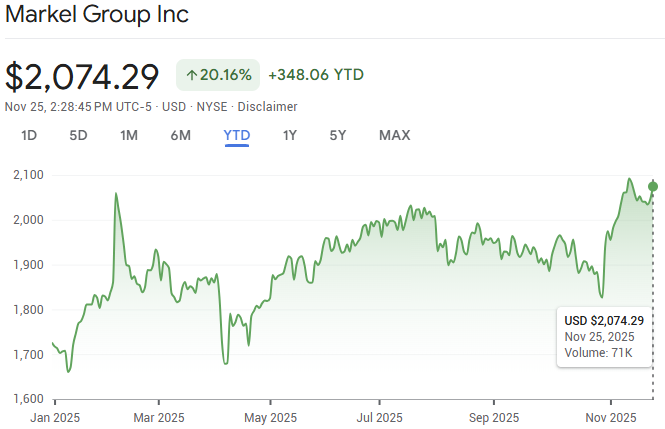Where Strong Returns Are Coming From: Alternatives That Are Winning This Year
- Rachelle Thielman

- Nov 25, 2025
- 4 min read
If you only watch the headlines, markets sound uncertain. Interest rates are still high, inflation seems better but not “solved,” and economists switch between optimism and caution almost every week. Yet, while all this noise grabs attention, something more important has been happening quietly underneath.
Some companies are simply still winning.
Not because markets are calm, but because their business models meet real economic needs, lending money when banks won’t, powering the digital world, underwriting risk, or compounding capital over decades. These strengths don’t rely on stock market excitement. They rely on real activity in the real economy.
Below are five companies in our portfolio that continue to deliver strong momentum, supported by recent earnings.
Ares Management: Lending Where Banks Can’t
When banks step back from corporate lending, companies still need financing. Ares has built its entire model around this simple reality, and Q3 confirmed that it continues to pay off.
In Q3, Ares reported strong private credit growth, as companies increasingly rely on non-bank lenders to finance acquisitions, expansions, and recapitalizations. The demand for direct lending keeps rising, especially from larger, more complex borrowers who need customized structures.
Why this matters now?
Ares earns revenue whether markets are volatile or not, because businesses must operate, borrow, and invest in both good and difficult periods. The less banks lend, the more Ares can. Ares is like a custom tailor in a world of off-the-rack suits. When the standard lending system says “we don’t have your size,” Ares designs a perfect fit.
Blue Owl Capital: Bringing Alternatives to Everyone
Unlike older players that built alternatives for giant pension funds, Blue Owl is building them for wealth managers and individual investors. The firm recently closed around $850 million in new commitments for its alternative credit strategies, a sign of rising demand from everyday portfolios, not just large institutions.
Its business model mirrors one of the biggest trends in finance: private credit is moving from niche to mainstream. Instead of waiting for IPO markets or mergers to create returns, Blue Owl focuses on income-producing lending that pays investors regularly.
Why this matters now?
Investors want yield without depending on the stock market. Blue Owl provides just that.
Blue Owl isn’t building a private market “club.” It’s building a highway; fast, accessible, and growing busier by the day.
Brookfield: Powering the Digital and Renewable Future
Brookfield is one of the few companies building the infrastructure the world urgently needs, not only for renewable energy, but for the electricity-hungry AI and data center boom.
In recent results, Brookfield reported continued strong fundraising momentum and rising long-term commitments from institutional clients, especially in infrastructure and energy transition strategies. This isn’t surprising: AI data centers need far more electricity, and renewable power projects require capital.

What this tells us:Investors are rewarding companies that don’t “bet” on growth, they physically build it. Brookfield isn’t speculating on the future. It’s engineering it. If data is the new gold, Brookfield is building the mines, the shovels, and the electricity to run them.
Markel Group: Insurance + Compounding Power
Markel operates in a way that most insurance companies cannot. It writes specialty insurance with strong pricing power, and then it invests the insurance float into real businesses through Markel Ventures.
In Q3, Markel posted continued premium growth and stronger underwriting profitability, showing that it is both writing more policies and doing so more profitably. The combination of disciplined underwriting plus private business ownership has been delivering results in a market searching for stability.

What this tells us: Investors are drawn to business models that compound slowly, quietly, and consistently, without market drama. Markel doesn’t sprint. It walks steadily uphill, and because it never runs out of breath, it ends up ahead.
Berkshire Hathaway:The Original Alternative Allocator
Before alternative investing was a category, Berkshire Hathaway was already doing it. Insurance float, energy assets, railroads, private companies, cash allocation — this is alternative investing in its purest form.
In its latest quarter, Berkshire reported record insurance earnings and continued growth in operating income, supported by strong pricing power in its insurance subsidiaries. Its cash position has exceeded $200 billion, ensuring it can take advantage of opportunities as they come.

Consistency can outperform complexity. The market trusts Berkshire not because it predicts what will happen next, but because it stays ready for whatever does.
Berkshire plays the long game with a full tank of fuel. When others stall, it accelerates.
What These Winners Tell Us
These companies didn’t succeed because markets were calm, they succeeded because the world needed what they provide.
Companies still need financing → Private credit grows
AI and data centers need electricity → Infrastructure grows
Risks still need specialty insurance → Underwriting grows
Capital needs disciplined allocation → Insurance float compounding grows
Alternatives don’t need market enthusiasm to generate returns. They just need a functioning economy, and that continues no matter what the headlines say.
These results show why alternatives are more than a diversification tool. They can be engines of steady, real-world value. When markets are uncertain, they rely less on sentiment and more on lending, building, insuring, and allocating capital carefully.
If you want to explore how these themes fit within your portfolio, or how alternative exposure can support your long-term goals, we would be more than happy to walk through it with you.
Disclaimer
This blog is for informational purposes only and does not constitute investment advice, financial guidance, or a recommendation to buy or sell securities. The companies mentioned are examples and may or may not be appropriate for your situation. Investing involves risk, including the potential loss of capital. Past performance does not guarantee future results. Always consult a qualified financial advisor before making investment decisions.



Comments